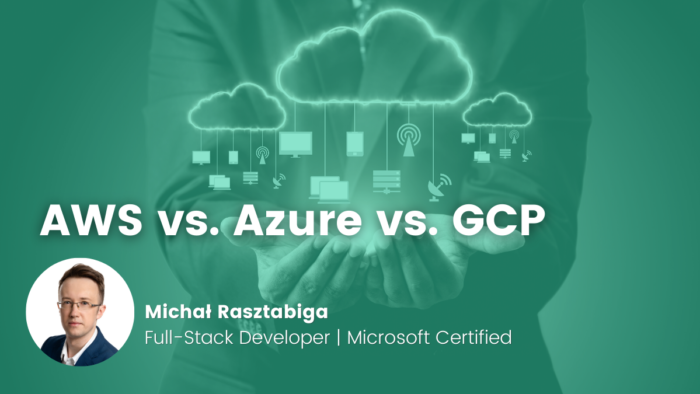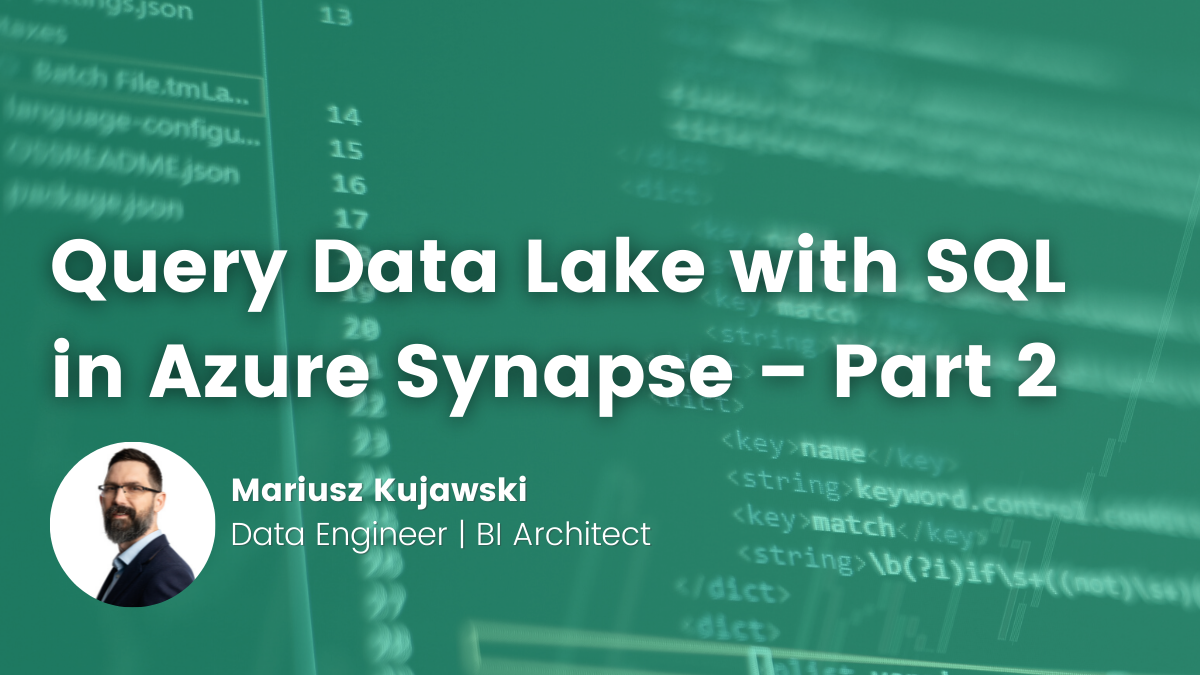- Michał Rasztabiga
- Read in 5 min.
Cloud computing has revolutionized the IT industry, providing a cost-effective, scalable and flexible solution, for companies of all sizes. It is a convenient method of delivering computing services, including servers, storage, databases and various applications. Solutions are available on-demand, without the need to invest in expensive hardware and data centers infrastructure.
In this article, we will compare several popular cloud computing services. AWS vs Azure vs Google Cloud Platform and a few more niche players.
The Cloud Computing Oligopoly
When we think of cloud solutions, three companies’ products immediately come to mind. Azure (Microsoft), Google Cloud Platform (Google) and Amazon Web Services (Amazon). Why is that?
AWS, Azure and GCP have become dominant players in the Cloud market, and other Cloud providers are struggling to compete with them. This is due to several aspects:
- Early Mover Advantage: AWS was the first major Cloud provider, launching in 2006, followed by GCP in 2008 and Azure in 2010. These companies were able to establish a strong market position and build a customer base, but most importantly were driven by innovation that continued to grow.
- Scale: AWS, Azure and GCP have vast resources, allowing them to invest heavily in research and development, build extensive global infrastructure and offer a wide range of services and features, including AI-driven ones.
- Competitive pricing: because these solutions have a massive customer base and huge revenues, they are able to set lower prices, and it is difficult for other providers to match.
- Ecosystem: AWS, Azure and GCP have built extensive ecosystems of third-party providers and developers, making it easy for companies to integrate their applications and services with other platforms.
- Brand recognition: AWS, Azure and GCP are backed by large, well-known technology companies (Amazon, Microsoft and Google), giving them a level of brand recognition and trust that other providers may struggle to match.
Nonetheless, certain providers are finding ways to differentiate themselves by focusing on specific niches. IBM, for example, focuses on enterprise customers, while Digital Ocean targets developers.
Popular Cloud Providers Comparison: AWS vs Azure vs Google Cloud Platform
Google Cloud Platform (GCP)
GCP is a cloud computing platform that provides a range of services. Its strengths lie in strong data analytics capabilities and focus on artificial intelligence (AI) and machine learning (ML) services. The cloud services it provides are known for being highly scalable, secure, and reliable. However, GCP can be a bit challenging to navigate, but with a good team or partner you can leverage its power without any issues.
If you are looking for a reliable GCP service delivery contractor, we can be your ideal match, as Devapo is a certified GCP Partner.
Amazon Web Services (AWS)
AWS offers a broad range of services, including computing, storage, and databases, as well as AI and ML tools. It is known for its high scalability and flexibility. Its extensive documentation and user community make it easier to use than some other cloud offerings. However, AWS can be more expensive than other cloud service providers, and its complex pricing model can make it difficult to estimate costs accurately.
Microsoft Azure
Azure also offers a wide range of cloud offerings, including computing, storage, databases, and artificial intelligence services. Azure can be easily integrated with Microsoft’s enterprise tools, such as Windows Server and SQL Server. It has strong support for hybrid cloud deployments. However, Azure’s pricing model can be somewhat confusing, and some users have reported difficulties with support. Therefore, it’s good to either use the help of an experienced team or a comprehensive partner.
More niche Cloud solutions
In addition to the above cloud giants, there are also more niche providers that offer cloud services tailored to specific industries or use cases.
IBM Cloud
IBM’s Cloud services focus on AI and are designed to help organizations transform their businesses with cutting-edge technologies. In situations where your app has stringent security or regulatory demands that are better met through the use of dedicated bare metal servers, relying on cloud-based solutions may not appear to be a feasible option. IBM, however, provides bare metal solutions with hundreds of highly configurable options, granting users exclusive access to a complete server. Among different cloud solution providers, IBM is considered the best in that regard. IBM’s cloud services are also highly customizable and can be tailored to fit the unique needs of each organization. However, IBM’s cloud services can be more expensive than some other cloud providers.
Heroku
Heroku is a cloud service provider that allows developers to build, run, and scale applications in several programming languages. It offers a range of services, such as a managed PostgreSQL database, add-ons for caching and monitoring, and a container registry. Heroku is a popular choice for startups and small businesses. It is owned by Salesforce and offers seamless integration with other Salesforce products.
DigitalOcean
DigitalOcean is a cloud platform that provides developers with a simple and cost-effective way to deploy and scale applications. It offers virtual servers, object storage, and other infrastructure services.
Key parameters of Cloud computing platforms comparison
In terms of pricing, AWS vs Azure often come out more expensive than GCP. However, each provider’s pricing model is unique and can vary depending on the specific services used. It’s worth considering the services of an official Cloud Partner. They can often provide effective cost optimization and offers best suited to your needs.
As for performance, GCP is known for its fast response times and low latency. In terms of security, all three cloud solutions are highly secure. They offer a range of features for applications and data protection. Concerning customizability, IBM offers the most flexibility, with GCP coming in second.
Cloud provider comparison of AI service offerings
Almost all cloud solutions offer AI-powered services that can facilitate your daily operations. Let’s dive into some examples:
- Amazon Web Services (AWS) offers a wide range of artificial intelligence services, including Amazon SageMaker for building and training machine learning models; Amazon Recognition for image and video analysis; Amazon Lex for building chatbots; and Amazon Polly for text-to-speech conversion.
- Microsoft Azure offers Azure Cognitive Services for natural language processing and computer vision; Azure Machine Learning for creating ML models; and Azure Bot Service for building intelligent chatbots.
- Google Cloud Platform (GCP) uses Google Cloud AI Platform for building and implementing ML models; Google Cloud Vision for image analysis; Google Cloud Speech-to-Text and Text-to-Speech for audio analysis; and Google Dialog Flow for building conversational interfaces.
- IBM Cloud provides Watson Studio for building and deploying machine learning models; Watson Assistant for building chatbots and conversational interfaces; and Watson Discovery for analyzing unstructured data.
Supporting in Migrating to the Cloud and Leveraging Cloud Solutions
At Devapo, we offer consultation to help you understand the benefits and risks of using cloud infrastructure. This includes assessing your company’s current infrastructure, identifying potential areas for improvement, and recommending the best cloud solutions for your specific needs.
We can also drive or assist in the migration of your applications and data to the cloud. This involves designing and implementing cloud architecture, setting up the necessary cloud infrastructure, and ensuring a seamless transition to the new platform. If you want to leverage various cloud solutions, we can integrate them with your current systems.
With a team of developers with strong data and cloud skills, proven by their certifications from Azure and GCP, we can help you migrate to the future.
Summary
Cloud computing is an essential technology that can help companies stay competitive, innovate, and thrive in an ever-changing digital landscape. However, when comparing AWS, Azure, and GCP on a basic level, you can see that they are quite similar.
While there are minor differences between them, they all offer a range of cloud services that can help your business transform and optimize operations. Therefore, choosing based on their features alone can be tricky. A deeper evaluation is necessary, especially by understanding your needs and capabilities. In the next articles, I will delve into more technical aspects.
Leverage cloud potential to scale your business
Tell us about your needs and we will make them happen









